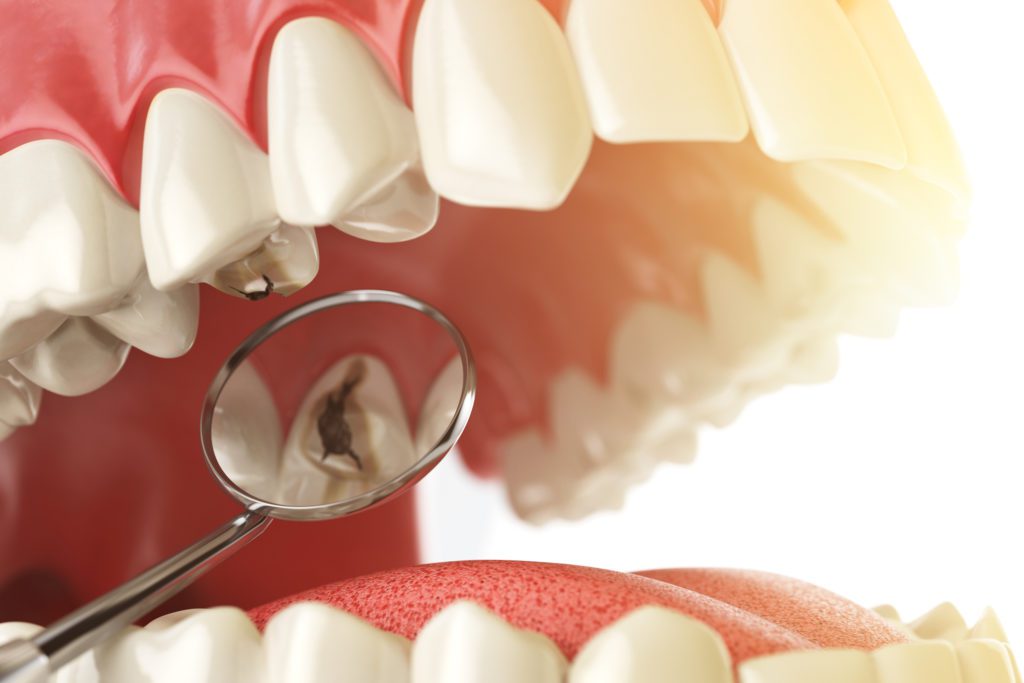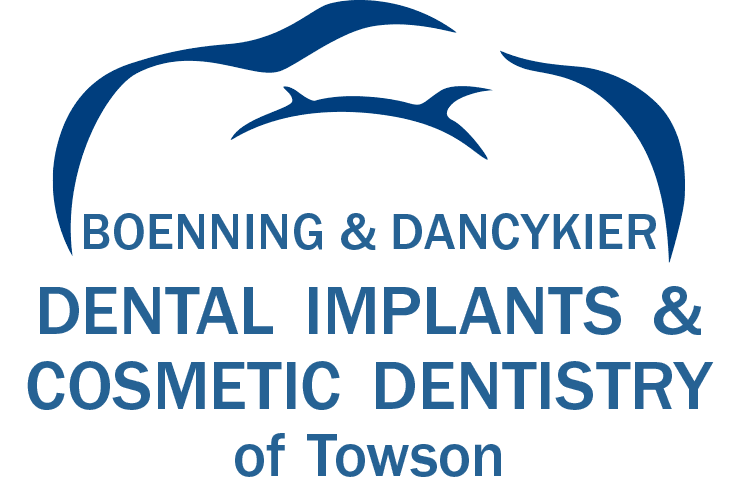Dr. Keith Boenning and Dr. Nate Dancykier are dentists in Towson, MD, that prevent and treat many dental concerns. During each routine dental checkup, they will look for signs of decay on your teeth. Tooth decay, or dental cavities, is a common problem they see daily. It is very prevalent among children.
However, adults still suffer from dental cavities as well. Because it is so common, routinely checking for tooth decay should be a part of your regular oral hygiene routine. Twice a year visits to the dentist will ensure your teeth are free of decay. Your dentist can catch decay before it becomes a larger problem.

What is Tooth Decay?
Dental cavities can lead to serious tooth damage without prompt treatments. Tooth decay occurs when the enamel, the hard outer layer of the tooth, begins to break down. This damage to the tooth’s surface will not stop progressing without treatment. When plaque sits on your teeth, it will eat away at your enamel, creating tiny openings or holes, known as cavities.
What is Plaque?
When we eat sugar and carbohydrates, the bacteria in your mouth produces harmful acids. These acids, along with bacteria, food particles, and saliva, form a substance called plaque.
Plaque is a sticky film that will coat your teeth. If left for too long, it will harden into a substance known as tartar. Brushing your teeth multiple times daily will remove the plaque from your teeth and prevent decay.
What Contributes to Tooth Decay?
Several things contribute to tooth decay but poor oral hygiene habits are the number one cause of it. Also consuming an excess amount of sugar, carbohydrates, and acidic foods and beverages can contribute to decay. The easiest way to prevent decay is to brush your teeth at least twice a day, floss at least once a day, and limit sugar and starches. Get fluoride treatments to protect your teeth against tooth cavities as well.
Treatment for Tooth Decay in Towson, MD
Dr. Keith Boenning and Dr. Nate Dancykier offer several treatments to help patients tackle tooth decay. The treatment they will choose for you will depend on the extend of the damage to your tooth. They will conduct an examination and then decide which treatment is best for you.
Tooth Filling
A dental filling is the most common general dentistry treatment for tooth decay. This conservative treatment will stop the decay from progressing and also fix the existing damage.
Our dentist will first remove the decayed portion of the tooth, and then remove all bacteria and debris. This will clean the tooth thoroughly, preparing it for treatment. Then our dentist will place a filling material, typically a tooth-colored composite resin, inside of the cavity.
Once the filling material is in place, our dentist will shape it by hand. The filling will fit the natural shape of the tooth and your bite. The last step is to polish the tooth to help it resemble a natural tooth.
A dental filling will repair the damage and help prevent further damage by sealing off the vulnerable area. The filling will prevent cracks, breaks, and chips and help preserve the natural tooth for as long as possible.
Restorative Dental Care
Without treatment, it will continue to progress and grow larger. The longer you wait to have it treated, the more damage your tooth will suffer. In this case, your dentist may need to use various restorative dentistry treatments to fix your teeth.
Dental Crown
A dental crown can fix a large cavity by providing a protective cover for a severely decayed tooth. Not addressing tooth decay in a timely manner will create a cavity too large for a standard dental filling.
Your dentist will remove the decayed portion of the tooth, and then reduce the size of the tooth to accommodate the crown. We will take dental impressions of the prepared tooth to create the custom dental crown. The crown will encase the entire tooth and resemble a natural tooth.
A tooth crown will restore the appearance, shape, and function of the tooth. The dental crown will also protect the weak tooth from further decay and damage. To learn more about the dental crown process, visit Dental Crown.
Root Canal Therapy
Without tooth decay treatment, the decay can reach the innermost part of the tooth. Here, it can cause the pulp to become inflamed and infected. This causes severe pain and damage to the tooth.
Your dentist will perform root canal therapy to remove the infection from inside the tooth. Cleaning the interior of the tooth will address the decay and infection. In most cases, your dentist will also place a dental crown to restore the weakened tooth.
Dental Extraction
The dentist may recommend a tooth extraction if he cannot fix severe tooth decay. A dental filling, dental crown, or root canal treatment might not fully save the tooth. When tooth decay advances and compromises its integrity, extraction becomes the only option. To learn more about the dental extraction process, visit Tooth Extraction.
How to Avoid Tooth Decay
You can easily avoid tooth decay by committing to a good oral care routine. A good oral hygiene routine includes daily brushing and flossing. You also need to visit the dentist twice a year for teeth cleanings. In addition to cleaning, we also offer sealants to help avoid cavities.
Teeth Cleanings
Our dental hygienists perform teeth cleanings at every dentist appointment. We recommend that you visit us every six months for these cleanings. They help remove built-up plaque and tartar on your teeth in hard-to-reach places. If you skip these necessary appointments, plaque and tartar will eat away at your enamel and cause decay.
Dental Sealants
We also offer dental sealants, which are thin coatings of plastic that we paint onto the back molars. They will stick to the surface of the teeth where tooth decay is prevalent. We typically apply dental sealants to children’s molars when they erupt as an extra layer of protection. Children are more prone to tooth decay because of a lack of proper oral hygiene and too much sugar consumption.
Book a routine dental exam for a cavity screening by contacting our local dental office at 410-324-2294. You can also request an appointment online.
